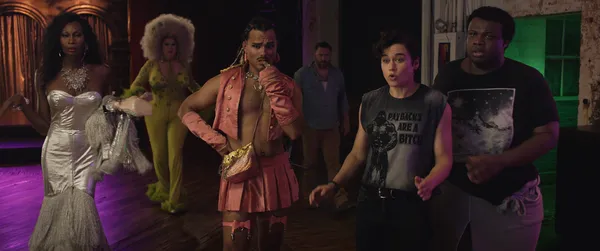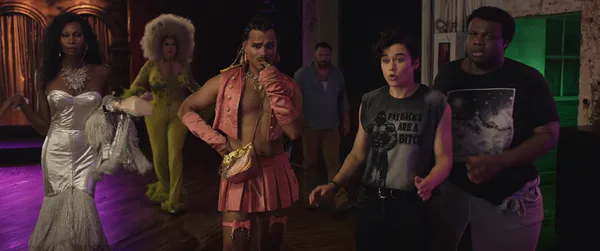Queens Of The Dead Photo: Fantasia International Film Festival
A sizzling new entry in the zombie film canon, Queens of The Dead has thrilled fans at Tribeca, Fantasia, BeyondFest, Newfest and more. It was always guaranteed to get attention because its director is Tina Romero, daughter of the legendary George Romero, but it will keep getting attention because it’s a strong film in its own right, and a lot of fun to watch. I was pleased to get the chance to discuss it with Tina, and I began by asking her if she made it out of a real love for the subject or because she knew what audiences would want, and wanted to get it out of the way before moving on to other things.
“Definitely more a love of the subject,” she says. “If you would have asked me when I was in school if I would make a zombie film, I would have said ‘Absolutely not. It’s not for me.’ Because I didn’t want to touch the genre unless I could figure out a way to do it that was authentic to myself, a story that I could tell. And then the idea came to me, in a burst of lightning. I spent many years DJing in the queer nightlife scene of New York City, and there was some big drama that happened between queer promoters. And one of the promoters posted something asking ‘When will the queer community stop devouring its own?’
Queens Of The Dead
“Reading that sentence, I had a holy shit moment. Like, ‘Oh, this is how I want to tackle zombies – it’s through the lens of queer nightlife.’ It just made so much sense to me, the idea of mashing up the amazing, wonderful, colourful, DIY, scrappy, creative characters from queer nightlife and the zombie apocalypse together. Drag queens and zombies. Holy shit, how fun! What a great marriage of worlds. And I knew this should be my first feature. So then I was just all in. I put everything else down. I just knew it in that moment once the idea came to me.”
I mention that I’ve seen people try to introduce queer characters and themes to zombie movies before, but this is the first time that I feel it has really gelled and felt organic. I think that’s because it has an insider perspective, with its banter and heart and sense of family.
“Yes,” she says. “You know, I have to give props to this amazing cast. I can’t believe how lucky we got with this incredible ensemble cast. And Erin Judge, my co writer, and I, from the beginning, we knew we wanted it to be an ensemble piece. We knew that we wanted to flip the script a little bit instead of having the token gay in the motley crew survival story. We wanted everybody to be queer. With our one guy thrown in from Staten island, who didn’t think he was going to be there on a Saturday night, but ultimately is pretty happy that he is. And I think having having the full spectrum represented allowed for our actors to live in their skin more comfortably and embody their authentic queer selves. Because we also cast this movie as queer as possible. We have real life, real, live queer people playing these roles. And I think that brings out authentic flavour. They all brought so much of themselves to their performance, and I think that translates.”
I tell her that I recently spoke with Brooke H Cellars about her film The Cramps: A Period Piece, which also features drag queens, and she said that it was great because they knew how perform to begin with, and all she had to do was point the camera at them and tell them what they were doing. But there’s a bit of a difference between that and getting into character.
“I was very confident in these actors,” she says. “They know what they’re doing. Nina West is an incredible performer. She has an acting background. And that was something that we talked about in the casting. We wanted to make sure that we were looking for drag queens who have had acting jobs, you know, because it’s one thing to give an amazing show and do death drops and splits all day and perform your face off in front of an audience, but to act on camera is different. We wanted to make sure we found that intersection of drag and acting jobs. And Julie J and Nina West are both just true professionals and they knew what to do.”
Going back to what she said before about her cast, we discuss the guy from Staten Island, Quincy Dunn-Baker’s Barry.
Queens Of The Dead Photo: Fantasia International Film Festival
“Barry was very much part of our plan,” she says. “When we had our initial whiteboard of characters, we always knew that the brother-in-law was an important one, an important surrogate for audiences who maybe aren’t familiar with this world, and actually a little bit based on my own little brother.
“You know, my little brother and I are on very different algorithms. We listen to very different podcasts. He is totally an ally. He just doesn’t have, you know.” She shrugs and I can see that she knows that I know. “I’ve had the experience of bringing my brother to Brooklyn to a drag show. His mind was blown and he was maybe a little bit uncomfortable in the back, but he had a great time, and that’s what I wanted to bring out with the character of Barry. Like, you know what? Just because we’re in different echo chambers online doesn’t mean that we can’t find common ground and understand each other.
“At the end of the day, Barry’s more of a foil than a villain. Our characters are not welcoming to him. He’s a little turned off by the world at first, but after spending a few hours together, you can’t help but find all of a sudden he’s staying, like, period. I like that. And I think that captures so much of what is wrong with us today – that we’re fighting over nothing. We’re fighting over comments on Instagram instead of actually finding common ground.”
Sometimes, in this film, that finding common ground thing extends to the zombies, and people try to reach out to them during the film. And there’s interesting situation where, at times, one can’t quite tell who’s a zombie and who isn’t.
“Yeah. Especially, you know, the whole concept of the Z-queen on the dance floor in the club. In Brooklyn, where people are wearing crazy hair and makeup to begin with and crazy outfits, maybe you might not recognise a zombie on the dance floor of a club. That was an image in my mind from the very beginning. A zombie loose on a dancefloor in a Brooklyn club, people not actually noticing because we’re too distracted. We’re having a good time, we’re drinking, we’re partying.
“Of course, the concept of too much information in a crisis was something I wanted to look at, too. Even if the news is saying one thing, your phone might be saying another thing, and the person coming in off the street has empirical evidence that doesn’t match that, and, like, who do you believe? What do you do? What do you listen to? In this day and age, when we have information coming at us from every fucking angle, how do you know? Is it the dead rising or is it just panic porn? That was something we wanted to play with as well.”
Queens Of The Dead
The other thing that stands out to me is that, whilst it’s a very accepting community and whilst people can have a lot going on and miss something like a zombie on the dance floor, people in the queer community are always ready for fight or flight on some level. Everyone’s been through that. Everyone’s had to look out for threat in a way that the straight community really hasn’t. The storytelling here seems to acknowledge that.
“Oh, yeah, absolutely. I mean, I think there’s no fighting spirit like the fighting spirit of the gays. We are used to it internally also, like, the internal battles that we have to fight as well as the battles in the world. And so we wanted this crowd to ultimately have more survivors than not, because at the end of the day, we have such a strong community, especially when we stick together and we know how to make it work. And we may not be using guns – because it’s boring to kill zombies with guns – but also, you know, it’s not necessary. We will figure out how to assemble our weaponry and get out alive. Metaphorically and literally, I believe that’s true. If the zombie apocalypse were to come, I would want to be surrounded by my people.”
So how does she feel about the success of the film on the festival circuit, and being at Newfest?
“I feel it is truly a dream come true. You go to film school and your dream is to make a feature film and to maybe put it on a big screen and have people see it. I just can’t believe it’s real. I’m pinching myself every day. I was so nervous to share the baby. I’ve been using a lot of pregnancy metaphors.” She laughs. “It was a long gestation period and a hard labour, and I was nervous to share the baby with the world. But the festival audiences have been so welcoming and gentle and nice about holding the baby, and it means the world to me. I’m thrilled.”





